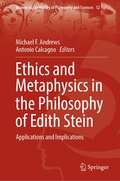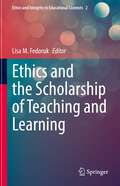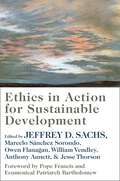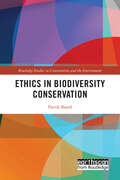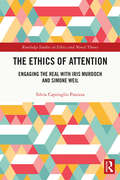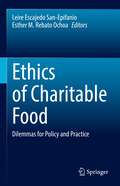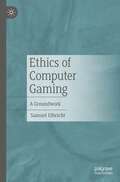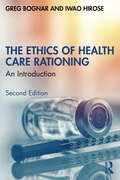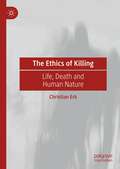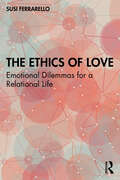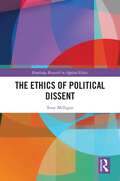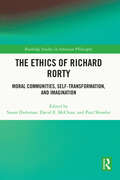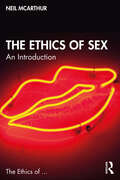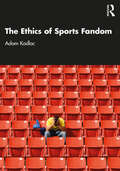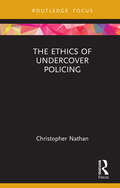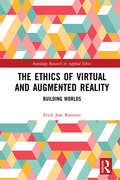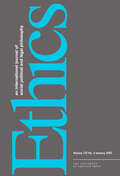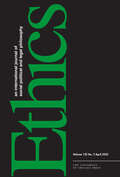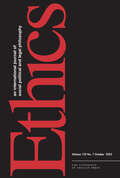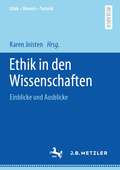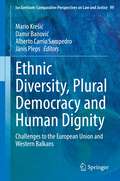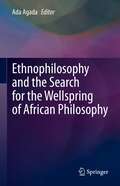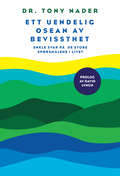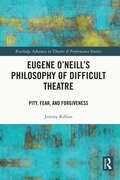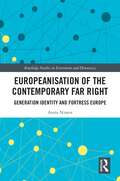- Table View
- List View
Ethics and Metaphysics in the Philosophy of Edith Stein: Applications and Implications (Women in the History of Philosophy and Sciences #12)
by Antonio Calcagno Michael F. AndrewsThis book is dedicated to Edith Stein (1891–1942), who is known widely for her contributions to metaphysics. Though she never produced a dedicated work on questions of ethics, her corpus is replete with pertinent reflections. This book is the first major scholarly volume dedicated to exploring Stein’s ethical thought, not only for its wide-ranging content, from her earlier to later works, but also for its applications to such fields as psychology, theology, education, politics, law, and culture. Leading international scholars come together to provide a systematic account of Stein’s ethics, highlighting its relation to Stein’s highly developed and complex metaphysics. Questions about the good, evil, the rights and ethical comportment of the person, the state, and feminism are addressed. The book appeals to scholars interested in the history of philosophical and ethical thought
Ethics and the Scholarship of Teaching and Learning (Ethics and Integrity in Educational Contexts #2)
by Lisa M. FedorukThis book addresses issues related to ethics and the scholarship of teaching and learning, and pays special attention to ethical concerns and experiences that have arisen from engaging in Scholarship of Teaching and Learning (SoTL) work. The book draws on a range of research projects, theoretical frameworks and narrative experiences to provide multiple perspectives of how meaning is made of research ethics in SoTL, academic community and REB partnerships, experiences of Students as Partners in SoTL, and ethically-minded approaches to teaching, learning and inquiry. Specifically, this edited book includes ethical practices that have become increasingly expansive in an ever-evolving academic environment such as navigating pandemic pedagogy and data ownership due to increased online content. In addition, contributions pertaining to academic community partnerships between REBs and faculty detail realistic narratives and lessons learned about how higher education can become more equitable, diverse and inclusive. Subsequently, decolonial ethics for teaching and learning in higher education, as well as participatory parity, exemplify the need for SoTL practitioners to be responsive to the social and cultural realities of a global context in ways that address social inequities and social responsibility. Relational ethics by way of student perspectives on vulnerability and classroom-based SoTL research underscore the need for students to be taught about their own agency as a means of providing student voice within SoTL work. Lastly, this book celebrates how ethically-minded approaches to teaching, learning and inquiry uncover strategies and pedagogy that encourage concepts such as ethical imagination and systems and design thinking practices.
Ethics in Action for Sustainable Development
by Sachs, Jeffrey D.; Sorondo, Marcelo Sánchez; Flanagan, Owen; Vendley, William; Annett, Anthony; Thorson, JesseThe Sustainable Development Goals, adopted by the United Nations in 2015, comprise an ambitious and sweeping agenda that unites economic, social, and environmental aims. What resources do the world’s religious and secular traditions offer in support of these objectives? Which principles do these traditions hold in common, and how can these shared values help advance global goals?This book presents an in-depth and deeply engaged conversation among interfaith religious leaders and interdisciplinary scholars and practitioners in pursuit of an ethical consensus that could ground sustainable development efforts. Drawing on more than two years of close-knit discussions convened by Jeffrey D. Sachs and Marcelo Sánchez Sorondo, it offers an extensive and inclusive vision of how to promote human flourishing. The book features theological, philosophical, and ethical deliberations of great diversity and depth on the challenges of sustainable development, addressing questions of poverty, environmental justice, peace, conflict, and the future of work. It includes consensus statements on the moral imperatives of sustainable development, introductions to seven major religious traditions and their conceptions of the common good, and thematic reflections. Wide-ranging and urgent, this book represents a major contribution to interreligious dialogue and to the articulation of a shared global ethics.The book features a foreword by Pope Francis and Ecumenical Patriarch Bartholomew.
Ethics in Biodiversity Conservation (Routledge Studies in Conservation and the Environment)
by Patrik BaardThis book examines the role of ethics and philosophy in biodiversity conservation. The objective of this book is two-fold: on the one hand it offers a detailed and systematic account of central normative concepts often used, but rarely explicated nor justified, within conservation biology. Such concepts include ‘values’ (both intrinsic, instrumental, and, more recently, relational), ‘rights’, and ‘duties’. The second objective is to emphasize to environmental philosophers and applied ethicists the many interesting decision-making challenges of biodiversity conservation. The book argues that a nuanced account of instrumental values provides a powerful tool for reasoning about the values of biodiversity. It also scrutinizes relational values, the concept of rights of nature, and risk, and show how moral philosophy proves indispensable for these concepts. Consequently, it engages with recent suggestions on normative aspects of biodiversity conservation, and show the need for moral philosophy in biodiversity conservation. The overriding aim of this book is to provide conservation biologists and policy-makers with a systematic overview of concepts and assessments of the reasons for reaching prescriptive conclusions about biodiversity conservation. This will prove instrumental in clarifying the role of applied ethics and a refined understanding of the tools it can provide. This title will be of interest to students and scholars of conservation biology, conservation policy, environmental ethics and environmental philosophy.
The Ethics of Attention: Engaging the Real with Iris Murdoch and Simone Weil (Routledge Studies in Ethics and Moral Theory)
by Silvia Caprioglio PanizzaThis book draws on Iris Murdoch’s philosophy to explore questions related to the importance of attention in ethics. In doing so, it also engages with Murdoch’s ideas about the existence of a moral reality, the importance of love, and the necessity but also the difficulty, for most of us, of fighting against our natural self-centred tendencies. Why is attention important to morality? This book argues that many moral failures and moral achievements can be explained by attention. Not only our actions and choices, but the possibilities we choose among, and even the meaning of what we perceive, are to a large extent determined by whether we pay attention, and what we attend do. In this way, the book argues that attention is fundamental, though often overlooked, in morality. While the book’s discussion of attention revolves primarily around Murdoch’s thought, it also engages significantly with Simone Weil, who introduced the concept of attention in a spiritual context. The book also engages with contemporary debates concerning moral perception and motivation, empirical psychology, animal ethics, and Buddhist philosophy. The Ethics of Attention will be of interest to researchers and advanced students working on Iris Murdoch, Simone Weil, ethics and moral psychology, and the philosophy of attention.
Ethics of Charitable Food: Dilemmas for Policy and Practice
by Leire Escajedo San-Epifanio Esther M. Rebato OchoaThis book provides an in-depth analysis of different dimensions of contemporary food charity. It does so against the background of an increasing number of food banks and other forms of food philanthropy. The book examines the incongruity of considering food donation as an expression of 'pure altruism'. Taking into account the dignity and rights of people, it addresses how hunger is seen and explained in rich countries and how philanthropy and democracy coexist. It looks at the relationship that exists between religious traditions and the current food donation narrative. It discusses the risks of stigmatizing food recipients, and clarifies ways to better deal with food poverty and food waste. Paradoxically, food insecurity and food waste have grown exponentially in the last decade. More and more people are not able to access food properly. The amount of perfectly edible food that is discarded also grows. The consolidation of democracies, welfare policies, and economic growth do not guarantee that all citizens can meet their basic needs in the so-called rich countries. This book analyses the current state of affairs and presents facts and reflections from diverse sources and from a cross-disciplinary perspective.
Ethics of Computer Gaming: A Groundwork
by Samuel UlbrichtDespite the increasing number of gamers worldwide, the moral classification of computer gaming marks an as yet unsolved riddle of philosophical ethics. In view of the explosive nature of the topic in everyday life (as seen in various debates about rampages), it is obvious that a differentiated professional clarification of the phenomenon is needed: Can playing computer games be immoral?To answer this question, the author first discusses what we do at all when we play computer games: What kind of action are we talking about? The second step is a moral classification that reveals whether (and if so, why) some cases of computer gaming are morally problematic. The considerations made here provide a fundamental insight into the normative dimension of computer gaming. Samuel Ulbricht studied philosophy and German studies in Stuttgart, where he passed his first state examination. He completed his second state examination in Heidelberg. For his final thesis on the ethics of computer gaming, he received the "Prize of the Friends of the University of Stuttgart". His current research focuses on normative differences in moral theories, problem areas in applied ethics, the aesthetics and ethics of computer games and the ethics of education and teaching. He currently works at the Johannes Gutenberg University of Mainz.This book is a translation of the original German 1st edition Ethik des Computerspielens by Samuel Ulbricht, published by J.B. Metzler, an imprint of Springer-Verlag GmbH Germany, part of Springer Nature in 2020. The translation was done with the help of artificial intelligence (machine translation by the service DeepL.com). A subsequent human revision was done primarily in terms of content, so that the book will read stylistically differently from a conventional translation. Springer Nature works continuously to further the development of tools for the production of books and on the related technologies to support the authors.
The Ethics of Health Care Rationing: An Introduction
by Greg Bognar Iwao HiroseThe rationing of health care is universal and inevitable, taking place in both poor and affluent countries, in publicly funded and private health care systems. Someone must budget for as well as dispense health care whilst aging populations severely stretch the availability of resources. The Ethics of Health Care Rationing is a clear, timely, and much-needed introduction to this important topic. Substantially revised and updated, this second edition includes new chapters on disability discrimination and age discrimination, and on the price of drugs and medical therapies. Beginning with a helpful overview of why rationing is an ethical problem, the authors examine the following key topics: What sort of distributive principles should we rely on when thinking about health care rationing? What is the relation between ethics and cost-effectiveness in health care? How should we think about controversies surrounding discrimination over disability and age? How should we approach controversies surrounding rationing and the price of pharmaceutical drugs and medical therapies? Should patients be held responsible for their health? Why does the debate on responsibility for health lead to issues about socioeconomic status and social inequality? Throughout the book, examples from the United States, the United Kingdom, and other countries are used to illustrate the ethical issues at stake. Additional features such as chapter summaries, annotated further reading and discussion questions have also been updated, making this an ideal starting point for students new to the subject, not only in philosophy but also in closely related fields such as politics, health economics, public health, medicine, nursing and social work.
The Ethics of Killing: Life, Death and Human Nature
by Christian ErkIn this book, Christian Erk examines the ethical (im)permissibility of killing human beings in general and of selected killings in particular, namely suicide, lethal selfdefence, abortion and euthanasia, as well as organ transplantation and assisted suicide. He does so by addressing a range of important ethical questions: What does it mean to act? Of what elements is an action comprised? What is the difference between a good or evil action and a permissible or impermissible action? How can we determine whether an action is good or evil? Is there a moral duty not to kill? Is this duty held by and against all human beings or only persons? What and who is a person? What is human dignity and who has it? What is it that is actually taken when somebody is killed, i.e. what is life? And closely related to that: What and when is death? By integrating the answers to these questions into an argumentative architecture, the book offers a comprehensive exploration of one of the most fundamental questions of mankind: Under which conditions, if any, is killing human beings ethically permissible?
The Ethics of Love: Emotional Dilemmas for a Relational Life
by Susi FerrarelloThis book explores the ethical and psychological dilemmas connected to the lived experiences of love, uniquely proposing an ethical framework that can be applied in loving relationships. The book provides an introduction to the study of ethics, moral psychology, and ancient philosophy. Examining key themes of love, such as unconditional love, romantic love, anger, desperation, and fairness, this book offers the reader a way to exercise and strengthen their personal critical thinking on ethical dilemmas, especially in relation to loving feelings. The author believes that ethics is the heart of love in the same way as logic is the brain of reasoning; we do not need ethics to love but we can love in a much healthier way if we train our ethical skills to love. After laying the theoretical framework for the book, chapters are organized into themes relating to ethical problems and begin with an exemplary piece from Greek and Latin literature. Using these writings as a starting point, Susi Ferrarello discusses whether it is possible to have a sound ethical theory of love, especially in cases relating to justice, despair, and rage, and demonstrates how this framework can be applied in new and established relationships. Filled with case studies throughout, spiritual exercises are listed at the end of chapters to help the reader increase their understanding of love and their ethical choices surrounding emotional dilemmas. This interdisciplinary book is essential reading for undergraduate and graduate students who take classes on ethics, marriage and family therapy, psychology, philosophy, classics, ancient philosophy, and politics, as well as those interested in the ethics of love and emotional decision-making.
The Ethics of Political Dissent (Routledge Research in Applied Ethics)
by Tony MilliganA broadly liberal politics requires political compassion, not simply in the sense of compassion for the victims of injustice but also for opponents confronted through political protest and (more broadly) dissent. There are times when, out of a sense of compassion, a just cause should not be pressed. There are times when we need to accommodate the dreadfulness of loss for opponents, even when the cause for which they fight is unjust. We may also have to come to terms with the irreversibility of historic injustice and reconcile. Political compassion of this sort carries risks. Pushed too far, it may weaken our commitment to justice through too great a sympathy for those on the other side. It would be convenient if such compassion could be constrained by a clear set of political principles. But principles run the quite different risk of promoting an ‘ossified dissent,’ unable to respond to change. In this book, Tony Milligan argues that principles are only a limited guide to dissent in unique, contingent circumstances. They will not tell us how to deal with the truly difficult cases such as the following: Should the Lakota celebrate Thanksgiving? When is the crossing of a picket line justified? What kind of toleration must animal rights advocates cultivate to make progress within a broadly liberal political domain? And how should we respond to the entangling of aspiration towards social justice with anger and prejudice (such as the ‘anti-Zionist’ discourse)? We may be tempted to answer these questions by presupposing that alignment (the business of choosing sides) is ultimately more important than compassion, but sometimes political compassion trumps alignment. Sometimes, being on the right side is not the most important thing.
The Ethics of Richard Rorty: Moral Communities, Self-Transformation, and Imagination (Routledge Studies in American Philosophy)
by Susan Dieleman David E. McClean Paul ShowlerThis book contains diverse and critical reflections on Richard Rorty’s contributions to ethics, an aspect of his thought that has been relatively neglected. Together, they demonstrate that Rorty offers a compelling and coherent ethical vision. The book's chapters, grouped thematically, explore Rorty’s emphasis on the importance of moral imagination, social relations, language, and literature as instrumental for ethical self-transformation as well as for strengthening what Rorty called "social hope," which entails constant work toward a more democratic, inclusive, and cosmopolitan society and world. Several contributors address the ethical implications of Rorty’s commitment to a vision of political liberalism without philosophical foundations. Others offer critical examinations of Rorty’s claim that our private or individual projects of self-creation can or should be held apart from our public goals of ameliorating social conditions and reducing cruelty and suffering. Some contributors explore hurdles that impede the practical applications of certain of Rorty's ideas. The Ethics of Richard Rorty will appeal to scholars and advanced students interested in American philosophy and ethics.
The Ethics of Sex: An Introduction (The Ethics of ...)
by Neil McArthurThe Ethics of Sex: An Introduction systematically and comprehensively examines the ethical issues surrounding the concept of sex. It addresses important questions such as: How can we approach questions of sexual ethics in a philosophical way? Must we give affirmative consent to all sexual activity, and what would be the impact of implementing an affirmative consent standard into law? Can our dating preferences ever be considered a form of discrimination? Is BDSM sex compatible with feminism? Should we promote monogamy as the best way to live? Is it harmful to have a relationship with a robot? Should sex work be decriminalized? Is there a right to sex? Including discussion questions and suggestions for further reading at the end of each chapter The Ethics of Sex is the perfect philosophical introduction to the perennially topical issue, and ideal reading for students taking courses within the fields of applied ethics, sociology, law, religion and politics.
The Ethics of Sports Fandom
by Adam KadlacFans largely regard sports as an escapist pursuit—something that provides distraction from the cares and concerns of "real life." This book pushes back against a fully escapist account of sports fandom and argues that we should understand the value of fandom in terms of the ability of sports to prompt fans to reflect meaningfully on the notion of a good life. Even if we are not engaged in high-level athletics, it is possible to learn a great deal from those who are: what sacrifices are required to achieve our goals; how to persevere through failure and disappointment; and about teamwork and the rewards of accomplishing things together. Moreover, partisan fandom, which has been criticized from various quarters, can teach us valuable lessons about love and what it means to be invested in things over which we have no control. If our reflection on the efforts of individual athletes helps us reflect on our own pursuit of the good life, our attachments to teams can help us to cultivate a certain kind of humility and openness to all that life has to offer. The Ethics of Sports Fandom is an accessible resource for researchers and students interested in the ethics and philosophy of sport that offers an analysis of several different aspects of contemporary fandom: fantasy sports, the ways that fans interact with athletes on social media, violent sports, women’s sports, and the support for our countries’ national teams. In all these areas, reflecting on what it means to respect athletes as individual human beings engaged in their own pursuit of the good life requires that fans consider their sports-related behavior in a new light.
The Ethics of Undercover Policing (Routledge Focus on Philosophy)
by Christopher NathanDespite the media controversies surrounding high profile cases of undercover policing, it is not always clear what ethical issues are at stake. Can undercover policing be justified? What are the ethical issues surrounding concealment and infiltration? What larger questions does undercover policing raise about the nature of policing and the legitimacy of coercive state action? In this timely and clear account, Christopher Nathan explores these questions and more. He rejects the view that the consequences of undercover policing always justify the means, instead advancing an argument that through their actions people can make themselves morally liable to some forms of undercover policing. Drawing on several recent, high profile case studies, Christopher Nathan argues for a new understanding of proportionality in undercover policing that takes account of innocent parties, vulnerable targets, and manipulation into wrongful action. He also defends a central role for the judiciary in the oversight of undercover policing.
The Ethics of Virtual and Augmented Reality: Building Worlds (Routledge Research in Applied Ethics)
by Erick Jose RamirezThis book offers new ways of thinking about and assessing the impact of virtual reality on its users. It argues that we must go beyond traditional psychological concepts of VR "presence" to better understand the many varieties of virtual experiences. The author provides compelling evidence that VR simulations are capable of producing "virtually real" experiences in people. He also provides a framework for understanding when and how simulations induce virtually real experiences. From these insights, the book shows that virtually real experiences are responsible for several unaddressed ethical issues in VR research and design. Experimental philosophers, moral psychologists, and institutional review boards must become sensitive to the ethical issues involved between designing "realistic" virtual dilemmas, for good data collection, and avoiding virtually real trauma. Ethicists and game designers must do more to ensure that their simulations don’t inculcate harmful character traits. Virtually real experiences, the author claims, can make virtual relationships meaningful, productive, and conducive to welfare but they can also be used to systematically mislead and manipulate users about the nature of their experiences. The Ethics of Virtual and Augmented Reality will appeal to philosophers working in applied ethics, philosophy of technology, and aesthetics, as well as researchers and students interested in game studies and game design.
Ethics, volume 132 number 2 (January 2022)
by EthicsThis is volume 132 issue 2 of Ethics. Ethics features scholarly work that covers a range of topics pertaining to moral, political, and legal philosophy from a variety of intellectual perspectives, including social and political theory, law, and economics. Articles in the journal present new theories, apply theory to contemporary moral issues, and focus on historical works that have significant implications for contemporary theory. In addition to major articles, Ethics publishes critical discussions, symposia, review essays, and book reviews.
Ethics, volume 132 number 3 (April 2022)
by EthicsThis is volume 132 issue 3 of Ethics. Ethics features scholarly work that covers a range of topics pertaining to moral, political, and legal philosophy from a variety of intellectual perspectives, including social and political theory, law, and economics. Articles in the journal present new theories, apply theory to contemporary moral issues, and focus on historical works that have significant implications for contemporary theory. In addition to major articles, Ethics publishes critical discussions, symposia, review essays, and book reviews.
Ethics, volume 133 number 1 (October 2022)
by EthicsThis is volume 133 issue 1 of Ethics. Ethics features scholarly work that covers a range of topics pertaining to moral, political, and legal philosophy from a variety of intellectual perspectives, including social and political theory, law, and economics. Articles in the journal present new theories, apply theory to contemporary moral issues, and focus on historical works that have significant implications for contemporary theory. In addition to major articles, Ethics publishes critical discussions, symposia, review essays, and book reviews.
Ethik in den Wissenschaften: Einblicke und Ausblicke (Ethik – Mensch - Technik)
by Karen JoistenDas vorliegende Buch gewährt Einblicke und Ausblicke in unterschiedliche Disziplinen der Wissenschaft und die mit ihnen einhergehenden ethischen Probleme und Fragestellungen. Das Buch richtet sich neben dem akademischen Fachpublikum vor allem auch an ein breiteres Publikum, da Ethik nur nachhaltig sein kann, wenn auch die breite Bevölkerung sich kompetent und engagiert ethischen Problemen und Fragen stellt und in den Diskurs einbringt.Die Themen, die in diesem Band diskutiert werden, beziehen sich auf: Ethos und Pathos der Architektur, ethische Aspekte des Regierens, die Digitale Transformation, eine philosophische Unterscheidung von Roboter und Mensch, Grenzen der Medizin, ethische Kriterien der Technikfolgenabschätzung, ethische Entscheidungen im Nachhaltigkeitsmanagement und eine juristische Sicht auf Nachhaltigkeit und Umweltgerechtigkeit.
Ethnic Diversity, Plural Democracy and Human Dignity: Challenges to the European Union and Western Balkans (Ius Gentium: Comparative Perspectives on Law and Justice #99)
by Mario Krešić Damir Banović Alberto Carrio Sampedro Jānis Pleps“Given their ethnic diversity, to what extent, and at what cost and benefit to human dignity, can European countries adopt and adapt plural democracy?” The contributors to this volume offer answers to this question from a variety of multidisciplinary perspectives within the framework of the integral theory of law and the state. Their shared aim is to explain legal phenomena in the context of other relevant issues and to identify, analyse and critique conceptualizations, problems and situations. This volume is rooted in the historical and contemporary European experience with special cases from Bosnia and Hercegovina, Croatia, Latvia, Slovenia, Spain and Canada which are relevant for understanding the European problem. Solutions to the problem are sought through innovative interpretations of the rule of law, democracy and human dignity, which are followed by argumentation about how these concepts, when recognized as European legal principles, can be implemented in order to avoid ethnic conflicts.Following an introduction that defines the problem at the centre of the book and explains how legal theory can be used to address it, the book consists of eleven contributions divided into three thematic sections. The first covers topics concerning the European principles which can help avoid ethnic conflicts: the principle of compulsory adjudication in interstate relations, the principle of democracy, and principles regarding the recognition of individual and collective identities. These European principles are then investigated by drawing on legal and political theories. The second section presents three ways of conceptualizing ethnical needs in multi-ethnic states: asymmetric federalism, dêmoicratic account and cooperative federalism. The third and final section elaborates on issues concerning the protection of minority rights: the role of judicial ideology in protecting minority rights, citizenship, the EU mechanism for the protection of minority rights, and the importance of remembering tragic events affecting minorities.
Ethnophilosophy and the Search for the Wellspring of African Philosophy
by Ada AgadaThis book provides a case for the de-stigmatisation of ethnophilosophy by demonstrating its continuing relevance in contemporary African philosophy. The book brings together established and brilliant young scholars who defend ethnophilosophy as a unique source of African philosophy with the capacity to colour African philosophical scholarship, thereby distinguishing African philosophy from other philosophical traditions of the world and setting the stage for philosophical dialogue in the 21st century characterised by multiculturalism and globalisation. The volume addresses the future of African philosophy by closely linking the past of this tradition with the exciting projects of the contemporary system builders whose works emerge from the ethnophilosophical while transcending it. The book is aimed at African philosophy experts, scholars of intercultural philosophy, African studies scholars and graduate students of African and intercultural philosophy.
Ett uendelig osean av bevissthet
by Dr. Tony NaderEnkle svar på de store spørsmålene i livet. Prolog av David Lynch. «I denne milepælen av en bok, tilbyr Dr. Nader ideer og tanker som kan forandre verden. Han gir solide løsninger på spørsmål som lenge har fascinert og begeistret filosofer og forskere og dekker mangfoldige områder som hensikten med livet, det gode og det onde, hva er bevissthet, har vi frihet? Finnes det lov og orden eller bare kaos i universet? Hvordan kan vi utjevne forskjeller mellom ateisten og den troende, determinisme og frie valg? Hvordan gjøre det beste utav livet, oppfylle ønsker og skape fred og harmoni mellom mennesker og nasjoner? Han tilbyr disse løsningene basert på et enkelt underliggende paradigme som forener sinn, kropp og miljø i et osean av ren Væren, ren Bevissthet. En bok man må lese hvis man søker svar på mysteriene i livet, den absolutte og ultimate sannhet.»David Lynch «Jeg ønsker at alle skal vite hva Bevissthet er og hvordan man kan utvikle det for å kunne utnytte sitt full potensial som individ og som aktiv deltaker sammen med andre.»Dr. Tony Nader
Eugene O'Neill's Philosophy of Difficult Theatre: Pity, Fear, and Forgiveness (Routledge Advances in Theatre & Performance Studies)
by Jeremy KillianThrough a close re-examination of Eugene O’Neill’s oeuvre, from minor plays to his Pulitzer-winning works, this study proposes that O’Neill’s vision of tragedy privileges a particular emotional response over a more “rational” one among his audience members. In addition to offering a new paradigm through which to interpret O’Neill’s work, this book argues that O’Neill’s theory of tragedy is a robust account of the value of difficult theatre as a whole, with more explanatory scope and power than its cognitivist counterparts. This paradigm reshapes our understanding of live theatrical tragedy’s impact and significance for our lives. The book enters the discussion of tragic value by way of the plays of Eugene O’Neill, and through this study, Killian makes the case that O’Neill has refused to allow Plato to define the terms of tragedy’s merit, as the cognitivists have. He argues that O’Neill’s theory of tragedy is non-cognitive and locates the value of a play in its ability to trigger certain emotional responses from the audience. This would be of great interest to students and scholars of performance studies, literature and philosophy.
Europeanisation of the Contemporary Far Right: Generation Identity and Fortress Europe (Routledge Studies in Extremism and Democracy)
by Anita NissenEuropeanisation of the Contemporary Far Right explores the role of transnational European identity in far-right mobilisation strategies. Focusing on the national members of two trans-European far-right coalitions – Generation Identity and Fortress Europe – the author explores the extent to which European far-right extra-parliamentary actors Europeanise their mobilisation. Drawing on social movement literature, the book argues that national extra-parliamentary actors’ Europeanisation processes are influenced by their political and discursive opportunities and resources. Focusing on the groups’ mobilisation during the ‘refugee crisis’ (2015–2017), the analysis considers the groups’ frames, collective action, and coalition-building in the period, finding that the depth of the groups’ resources particularly affects their capacity to mobilise. This book will be of interest to scholars, students, and civil society actors in fields related to the far right, European studies, social movements, and migration.
